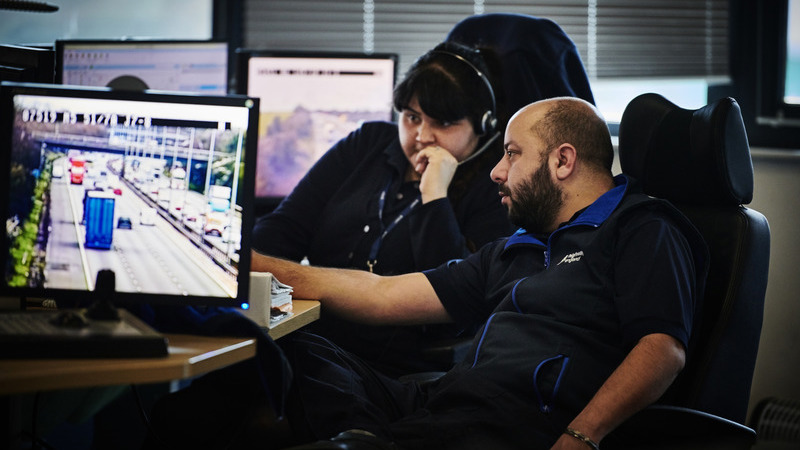Control Room Operators

Our Control Room Operators play a vital role in keeping our roads moving safely.
National Highways is responsible for looking after England’s motorways and major roads, and to do this we have seven control centres across the country, as well as a National Traffic Operations Centre.
The vast majority of journeys go smoothly and according to plan, but sometimes things do go wrong. Ranging from breakdowns, collisions, things falling from vehicles, people or animals on the roads to severe weather, we have to be ready to respond, to make sure that the roads are safe, and that people get moving again as soon as possible.
Our Control Room Operators are responsible for responding to emergency calls and setting signs and signals when they are required on our roads 24 hours a day, 7 days a week.
Not only are they our eyes and ears, but they are responsible for helping to manage incidents, deploying resources, such as traffic officers and maintenance crews, where they are needed and co-ordinating any emergency repairs that are needed. Working in a shift pattern of six days on and three days off, the job is extremely varied, and our advisors all say that no two days are the same. They work closely with our Traffic Officers and maintenance crews, and teamwork is a vital part of the job.
"Being a Control Room Operator is such a key role in our organisation. As often the first point of contact of customers in crisis your care, compassion and willingness to go the extra mile is critical to building positive relationships. Our operators show huge dedication and commitment, often working to tight deadlines to deal with incidents."Kerry Farrell - West Midlands Network Operations Manager
Meet some of our Control Room Operators:
The most important requirement for people in this role is sharing National Highways’ values. Here are some of our people talking about their roles and how they contribute to the National Highways team.
You can find out more about the role responsibilities and our training package for new starters at the bottom of this page.
Safety
Safety is always the first consideration at National Highways; whether it’s the safety of our customers, our supply chain or our own people.
The Control Room Operator role is front and centre, contributing to the safe use of our roads by customers, road workers, emergency services and Traffic Officers.
Teamwork
It's impossible to get the job done without teamwork; it’s vital that our people can work together to get the best and safest outcomes for our customers.
Teamwork also ensures that we give each other the support we need to develop ourselves, make good decisions and deal with challenges together.
Ownership and Integrity
Our Control Room Operators have a very important, and at times very serious role.
They need to be able to take ownership of situations to make important and timely decisions.
They also must use their integrity to make sure that decisions are made in the right way so that safety always comes first.
Passion
No two days in the control room are the same, and our people have to be prepared for anything!
Every Control Room Operator has stories about the unexpected things they have dealt with on the network.
Having a passion for what they do, and really caring about what happens to the people on our roads means that they are able to take it all in their stride.
"One major part of this role is being part of a team that looks out for each other, building strong bonds together to help resolve emergencies and keeps a positive attitude."Kerry Farrell - West Midlands Network Operations Manager
Control Room Operator key responsibilities
- Answering calls from people using our emergency roadside telephones, giving them safety advice and reassurance while arranging for Traffic Officers to go and assist
- Setting signs and signals to manage traffic and protect stranded people and their vehicles
- Dealing with issues and problems on the road by requesting Traffic Officers, Inspectors and Maintenance contractors to deal with anything ranging from emergencies to clearing debris off the road
- Keeping Traffic Officers and other emergency services up to date with key information when dealing with incidents
- Helping with the clean up processes after a incident or collision by requesting emergency repairs to make sure the road can re-open safely and as quickly as possible
- Working with other emergency services (ambulance, police, fire service) and utility companies to deal with incidents
- Monitoring and managing incidents from start to finish; be the eyes and ears and make sure that there is a co-ordinated approach, especially when there are lots of people and organisations involved.
- Maintaining accurate incident logs by recording information gathered from multiple sources
- Carrying out other duties as required to help the safe running and operation of the network and the Regional Operations Centre
Training and support in the role
People often think that you need a military or emergency services background to work in a Regional Operations Centre, but this isn’t true. National Highways provides a full four week training programme that includes:
- Call handling
- Customer service
- Emergency call handling
- Using the radio system to dispatch Traffic Officers
- Setting signals
- Managing CCTV cameras
- Managing road maintenance
Once training is complete, new Control Room Operators then have a coach to support them as they begin to work through their probation period in the live environment.
Find out more:
Working with us - find out more about our values and culture and how we can support you.
Employee benefits - find out more about what we can offer you if you work with us.









